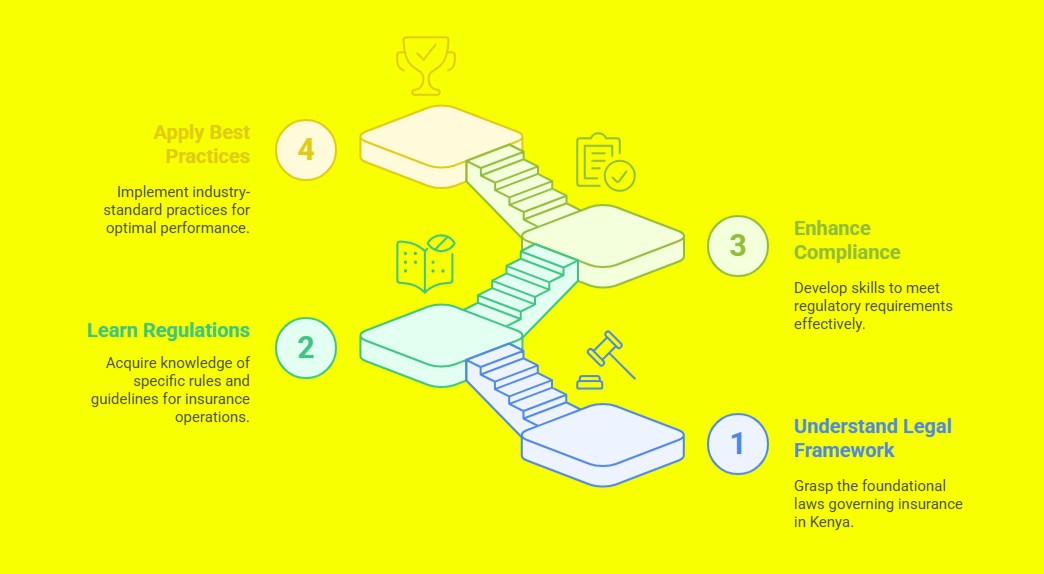
This comprehensive 5-day training course provides an in-depth understanding of the regulatory framework governing the insurance industry in Kenya and the critical aspects of compliance that insurance entities must adhere to. Participants will gain a thorough knowledge of the roles and responsibilities of the Insurance Regulatory Authority (IRA), the provisions of the Insurance Act and its subsidiary legislation, the processes for licensing and registration, the governance and financial requirements for insurers, the regulations concerning the conduct of business and consumer protection, the specific rules for insurance intermediaries, the guidelines for claims handling and dispute resolution, the importance of Anti-Money Laundering (AML) compliance, and emerging trends shaping the future of insurance regulation in Kenya. This course is essential for professionals working within the Kenyan insurance sector to ensure they operate within the legal and regulatory boundaries and uphold the integrity of the industry.
The training will cover key topics including an introduction to the objectives and principles of insurance regulation in Kenya, a detailed examination of the functions and powers of the Insurance Regulatory Authority, a comprehensive review of the Insurance Act (CAP 487) and relevant subsidiary legislation, the procedures and requirements for obtaining and maintaining licenses for insurance companies and intermediaries, the governance structures and financial solvency standards that insurers must meet, the regulations designed to protect insurance consumers and ensure fair business practices, the specific rules governing the activities of insurance agents, brokers, and bancassurance, the regulatory framework for handling insurance claims and resolving disputes, the crucial aspects of Anti-Money Laundering compliance within the insurance sector, and an exploration of emerging trends and potential future developments in insurance regulation in Kenya. Through interactive lectures, case studies, and practical discussions, participants will develop a strong understanding of the legal and regulatory landscape of the Kenyan insurance industry and the practical implications for their day-to-day operations.
Who should attend the training
Objectives of the training
Personal benefits
Organizational benefits
Training methodology
Trainer Experience
Our trainers are experienced legal and compliance professionals with specific expertise in the Kenyan insurance regulatory framework. They possess in-depth knowledge of the Insurance Act, IRA regulations, and best practices in compliance for the insurance sector in Kenya.
Quality Statement
This training course is designed to provide participants with accurate, up-to-date, and practical knowledge of insurance regulations and compliance in Kenya. We are committed to delivering high-quality content and engaging learning experiences that will empower individuals and organizations to navigate the regulatory landscape effectively and ethically.
Tailor-made courses
We understand that different insurance organizations may have specific compliance needs based on their size, the lines of business they operate in, and their internal structures. Our tailor-made courses can be customized to address your organization’s specific compliance challenges, focusing on the regulations most relevant to your operations and providing practical solutions tailored to your context within the Kenyan insurance market.
Course Duration: 5 days
Training fee: USD 1300
The Impact of Technology (Insurtech) on Regulation
Regulatory Responses to Emerging Risks (e.g., Cyber Insurance)
Sustainable Insurance and Environmental, Social, and Governance (ESG) Factors
Potential Future Amendments to the Insurance Act and Regulations
Practical session: Discussing the regulatory implications of a new Fintech product in the insurance sector
Requirements:
· Participants should be reasonably proficient in English.
· Applicants must live up to Armstrong Global Institute admission criteria.
Terms and Conditions
1. Discounts: Organizations sponsoring Four Participants will have the 5th attend Free
2. What is catered for by the Course Fees: Fees cater for all requirements for the training – Learning materials, Lunches, Teas, Snacks and Certification. All participants will additionally cater for their travel and accommodation expenses, visa application, insurance, and other personal expenses.
3. Certificate Awarded: Participants are awarded Certificates of Participation at the end of the training.
4. The program content shown here is for guidance purposes only. Our continuous course improvement process may lead to changes in topics and course structure.
5. Approval of Course: Our Programs are NITA Approved. Participating organizations can therefore claim reimbursement on fees paid in accordance with NITA Rules.
Booking for Training
Simply send an email to the Training Officer on training@armstrongglobalinstitute.com and we will send you a registration form. We advise you to book early to avoid missing a seat to this training.
Or call us on +254720272325 / +254725012095 / +254724452588
Payment Options
We provide 3 payment options, choose one for your convenience, and kindly make payments at least 5 days before the Training start date to reserve your seat:
1. Groups of 5 People and Above – Cheque Payments to: Armstrong Global Training & Development Center Limited should be paid in advance, 5 days to the training.
2. Invoice: We can send a bill directly to you or your company.
3. Deposit directly into Bank Account (Account details provided upon request)
Cancellation Policy
1. Payment for all courses includes a registration fee, which is non-refundable, and equals 15% of the total sum of the course fee.
2. Participants may cancel attendance 14 days or more prior to the training commencement date.
3. No refunds will be made 14 days or less before the training commencement date. However, participants who are unable to attend may opt to attend a similar training course at a later date or send a substitute participant provided the participation criteria have been met.
Tailor Made Courses
This training course can also be customized for your institution upon request for a minimum of 5 participants. You can have it conducted at our Training Centre or at a convenient location. For further inquiries, please contact us on Tel: +254720272325 / +254725012095 / +254724452588 or Email training@armstrongglobalinstitute.com
Accommodation and Airport Transfer
Accommodation and Airport Transfer is arranged upon request and at extra cost. For reservations contact the Training Officer on Email: training@armstrongglobalinstitute.com or on Tel: +254720272325 / +254725012095 / +254724452588
| Course Dates | Venue | Fees | Enroll |
|---|

Armstrong Global Institute
Typically replies in minutes